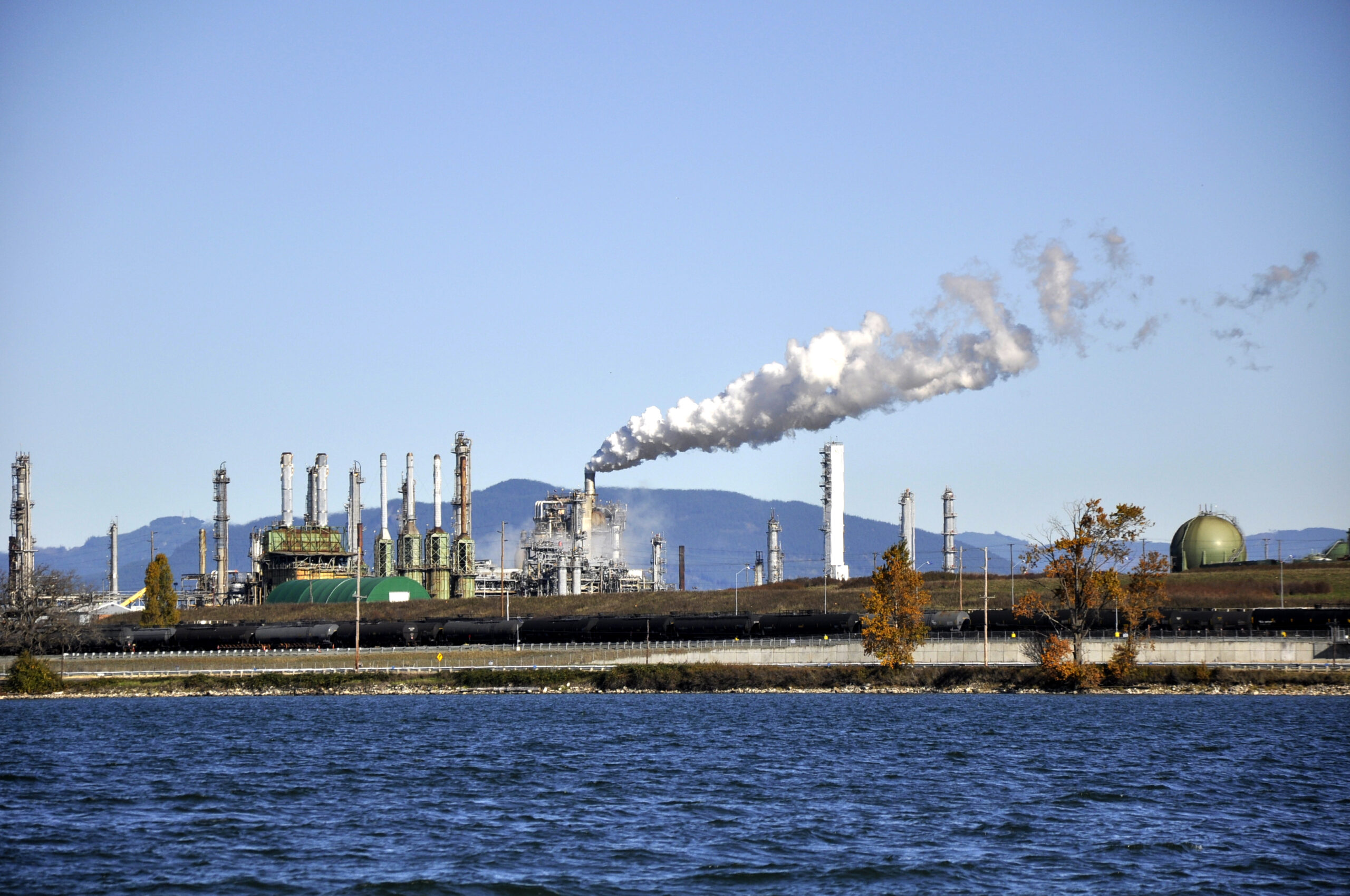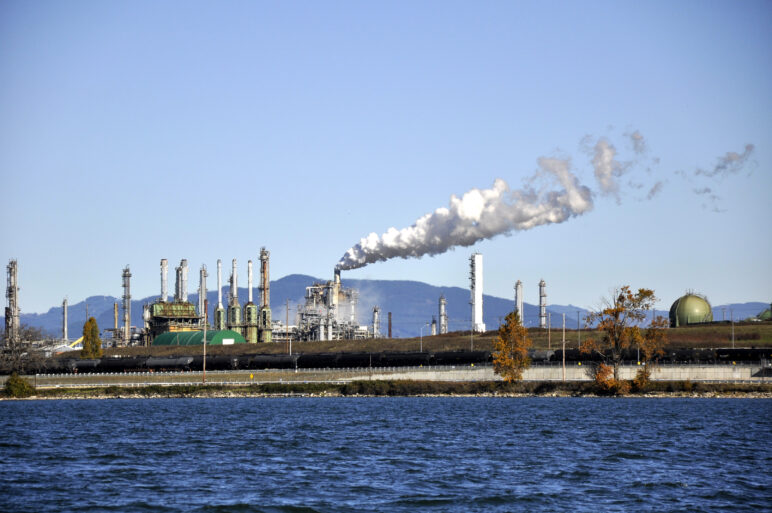Within Washington state’s newly released 2023 operating budget for the biennium is a nation-leading step toward oil refinery transition planning. Over the next two years, Washington will devote a quarter-million dollars to analyzing the future of the state’s refineries, laying the groundwork for a clean energy transition that supports workers, safeguards communities, and protects the environment.
There are five oil refineries on Puget Sound—in Pierce, Skagit, and Whatcom counties. But as Sightline has highlighted previously, the state lacks a roadmap to protect workers and communities dependent on these facilities as the region shifts off of oil. That’s a risky bet when experts project oil demand will peak and then continuously decline over coming decades and when, from 2019 through 2022 alone, seven oil refineries across the United States shut down operations without warning. These abrupt closures resulted in more than 3,400 layoffs, millions in lost local tax revenue, polluted land without a cleanup plan, and minimal community say over future redevelopment of the sites.
Washington is now embarking on a different, forward-looking path.
The new $250,000 budget proviso tasks the Washington State Department of Commerce with assessing the future of the state’s refineries. Though an initial budget request of $750,000 submitted to the Senate would have allowed for a fuller analysis, this more modest investment is an important first step. The Department of Commerce will contract with a consulting or research firm to implement the project.
Thanks to this investment, Washington and its refinery communities will gain important information they’ve been lacking to prompt future planning and to guide a thoughtful, inclusive process, including:
1. A transparent picture of both the feasibility and desirability of refinery conversion to alternative fuels. Oil refineries globally are touting conversion to alternative fuels like “renewable diesel” as the way of the future.1 Washington’s BP refinery already produces renewable diesel, and it is a much-discussed option for the other facilities in the state. But several US refineries that recently converted to this fuel laid off most of their workers and cut their tax payments significantly. Plus, biofuels like renewable diesel are coming under increasing scrutiny for their environmental hazards, including using prime farmland or forests to grow their soy or corn fuel feedstocks. Rather than relying solely on industry assurances, Washington will now gain a clear-eyed assessment of this oil industry proposal and its likely impacts on employment, local taxes, and the environment.
2. An understanding of options for workers and communities currently dependent on refineries. More than 4,400 people—2,000 employees and approximately 2,400 contractors—work in the Washington refineries, many unionized and earning well above area median income. In addition, the local governments that house the refineries currently collect from them more than $24 million in property taxes that pay for critical local community services like schools, fire departments, and libraries. To the first point, this proviso will fund the inaugural proactive assessment in Washington of refinery workers’ skillsets against alternative local industries, looking for transferability. To the second, it will forecast how local tax revenues may fall with reduced refinery output. With this information, Washington leaders will have a clearer view of needed investments to support refinery workers through the energy transition (see some ideas from a recent report on layoffs at a former Marathon refinery in California). And state and local leaders can use this information to start shoring up support for essential social services currently dependent on increasingly unpredictable fossil fuel markets.
3. An assessment of and proactive vision for what refinery sites could become—and the cleanup needed to get there. Washington and the communities that live near the refineries deserve to understand what the land that the facilities sit on today could become. Will the land need to stay industrial? Could it be repurposed for other uses, like BP’s former refinery in Casper, Wyoming, which is now a multi-use site with a business park, golf course, and kayak park that, together, employ more than 200 people? What would it take—in dollars, labor, and time—to clean up what is no doubt heavily contaminated soil and other messes? Who would pay, and how could taxpayers be protected? The proviso-funded study will address these points so that local communities can better advocate for the future they want to see for these long-polluted sites. This work will require the Department of Commerce to embark on a robust public engagement process with groups including labor, frontline communities, and environmental organizations, as well as to consult area Tribes to understand potential impacts to tribal rights and resources.
The project’s success will depend on the Department of Commerce selecting a consulting partner who can both conduct rigorous energy system modeling and lead in-depth, trusted community engagement. Once the findings are published in 2024, state legislators and local leaders should have the information they need to initiate a full-fledged, community-led planning process, perhaps similar to that of a coalition in California. And Washington will likely need new statewide policy solutions based on the report’s findings that can bolster support for workers and smooth the transition for refinery communities.
While the study is just a first step, Washington is now on its journey to planning for a more resilient, healthy future that supports the workers, environment, and communities that have long hosted the refineries.










